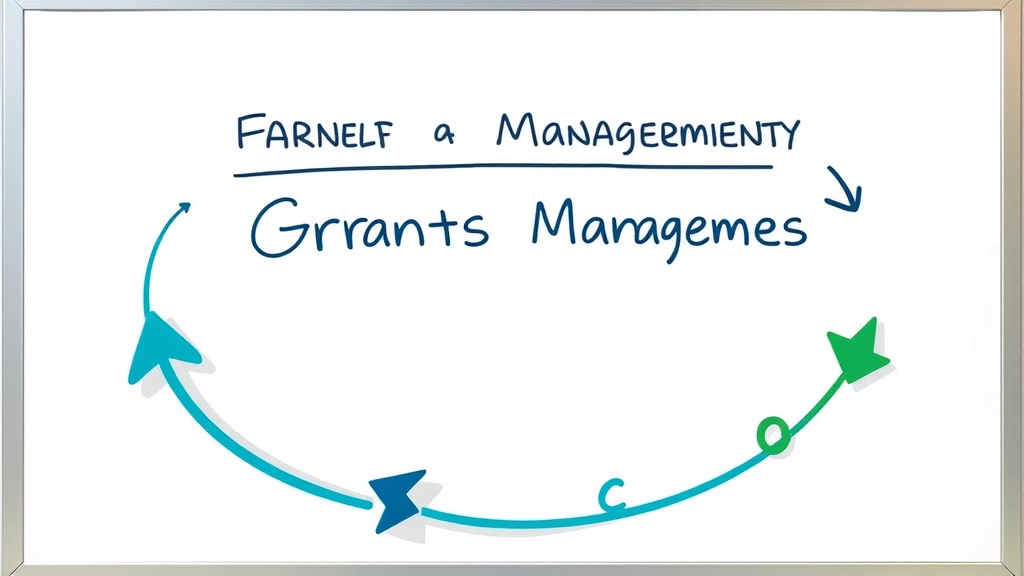Did you know that over $80 billion in nonprofit grants are distributed annually in the U.S.—yet thousands of nonprofits miss out due to poor grant management practices? For nonprofit organizations, securing and effectively managing grant funds is more than a skill—it’s the key to sustainable impact and growth. In this comprehensive guide, we’ll explore everything you need to know about grant management for nonprofits, from landing your next big award to maximizing every dollar and complying with funder requirements.
Unlocking Funding Potential: The Critical Role of Grant Management for Nonprofits
Nonprofit organizations face increasing competition for grant funding and ever-more complex requirements from government and private funders. Effective grant management for nonprofits is what separates sustainable organizations from those struggling to keep doors open. By understanding and improving the grant management process, nonprofits can unlock not only financial support but also credibility for future funding opportunities, improve their reporting, and maximize the impact of each project. A dedicated team member or team members who master grants management ensure proposals are competitive, applications thorough, compliance flawless, and reporting aligned with funders’ expectations and federal grant standards.
Failure to focus on strong grant management means risking missed deadlines, poor financial tracking, the jeopardy of future grants, and ultimately, less ability to serve your mission. By the end of this guide, you’ll have the tools and confidence your nonprofit needs to attract, steward, and leverage grant funds—and avoid the pitfalls that cost organizations millions every year in lost or returned grants. Let’s start unlocking your nonprofit’s full funding potential!

"Over $80 billion in nonprofit grants are distributed annually in the U.S.—yet thousands of nonprofits miss out due to poor grant management practices."
What You'll Learn About Grant Management for Nonprofits
- Defining grant management for nonprofits and its key processes
- Choosing the right grant management software
- Essentials of the grant application process and grant proposal creation
- Compliance and the common grant management rules
- Actionable strategies to maximize grant funds
- Answers to frequently asked questions (FAQs)
Grant Management for Nonprofits: Core Concepts and Definitions
What is Grant Management for Nonprofits?
At its heart, grant management for nonprofits is the structured process by which a nonprofit identifies, applies for, receives, utilizes, and reports on financial support provided by government entities, private foundations, or corporations. Unlike traditional donations, grant funds come with strict reporting requirements, detailed agreements, and defined project milestones—which makes the management process both challenging and essential. In essence, effective grant management ensures that your organization fulfills all contractual obligations, remains eligible for future opportunities, and optimizes every grant dollar to serve your mission. This process demands broad coordination among staff, careful financial tracking, compliance with the terms and conditions of each grant agreement, and methodical documentation at every step. For nonprofits, mastering grant management is the key to converting funding opportunities into real-world impact.
Nonprofit grant management also means continuous improvement—adapting to changing funder expectations, government regulations, and the evolving needs of the communities served. Whether you’re a small startup applying for your first federal grant or an established organization managing a multi-year grant life cycle, having a well-defined grants management process helps nonprofit teams stay organized, reduces risks, and increases confidence with both funders and beneficiaries.
The Grant Management Process: From Application to Stewardship
The grant management process for nonprofits is a sequence of interconnected stages—each vital to securing and realizing funding opportunities. It begins with understanding the nonprofit grant application process, where fundraising teams identify open grants, prepare compelling documents, and submit their cases for support. Once a grant is awarded, the focus shifts to compliance, project progress, and regularly reporting to funders. Key to all stages is tracking grant funds: managing budgets, gathering supporting documentation, and ensuring alignment with the entire grant agreement’s requirements. The process concludes with final reporting and closeout, a crucial time for learning and demonstrating project impact to both funders and boards.
A well-managed grant management process incorporates crucial steps such as transparent internal communication, deadline management, and software-assisted documentation. These best practices help nonprofits not only meet grant requirements, but also foster positive relationships with grantors, which increases chances for future funding. Let’s break down what every successful nonprofit organization should do during each phase of grants management, from searching for grant opportunities to measuring and showcasing results.
- Understanding the nonprofit grant application process
- Navigating the grant lifecycle
- Meeting grant requirements and agreements
- Tracking and reporting grant performance

The Grant Lifecycle: Stages in Grant Management for Nonprofits
| Stage | Description | Key Actions |
|---|---|---|
| Pre-Award | Preparing and submitting grant proposals | Identifying opportunities, drafting applications |
| Award | Securing grant agreements | Negotiating terms, confirming compliance |
| Implementation | Utilizing grant funds | Executing projects, tracking spending |
| Reporting | Documenting outcomes | Collecting data, submitting reports |
| Closeout | Finalizing the grant | Financial reconciliation, final reporting |
Understanding these grant lifecycle stages is fundamental. The pre-award phase involves careful research and planning, with an emphasis on matching your mission’s needs with the best funding opportunities. The award and implementation stages require a shift to compliance, project management, and ongoing financial oversight. Clear documentation and reporting in the final stages not only safeguard your current grant but also build trust and set the stage for future grant applications. Each piece of the process is interlinked; missing a step can result in lost funding and tarnished reputation with funders. That’s why mastering each phase is essential for modern nonprofit grant management.
Identifying Opportunities: Grant Application Strategies for Nonprofits
Essentials of Crafting a Successful Grant Proposal
The journey to winning grant funds begins with a well-researched, targeted, and compelling grant proposal. For nonprofits, this means identifying funders whose priorities closely match your mission and understanding both broad grant programs and nuanced requirements. The proposal itself is more than a budget and project summary—it's your story, backed by data and a demonstrated capacity to deliver. Start by thoroughly researching relevant federal grant and foundation opportunities, then tailor each application to speak directly to what different funders value most. Align your project outcomes with funder objectives; show measurable impact and organizational readiness.
Compelling storytelling, supported by clear evidence of program effectiveness and a detailed plan for use of grant funds, makes your grant application stand out in a crowded field. Include real-world success stories, statistics, and testimonials that validate your team’s ability to deliver. By connecting your mission to funder priorities, clarifying the need, and demonstrating credible impact, you position your nonprofit for consistent grant success. Remember: A strong grant proposal tells a compelling story while providing concrete evidence of capacity and impact.
- Researching relevant grant programs
- Understanding funder requirements
- Aligning mission/vision with grant priorities
- Compelling storytelling in grant applications
"A strong grant proposal tells a compelling story while providing concrete evidence of capacity and impact."
Navigating the Grant Application Process
The application process for nonprofit grants is both strategic and procedural. First, designate team members to track grant deadlines, gather required data, and ensure proposals are error-free. Use a checklist to confirm that every funder requirement is met—from financial statements to project benchmarks. Organize internal workflows to allow time for input from program, finance, and leadership staff so that each submission is comprehensive and aligned with the grantor’s expectations. Communication among team members is vital; regular meetings prevent oversights and keep application work on track.
Leverage technology—whether spreadsheets or advanced grant management software—to centralize information and allow easy collaboration. This approach not only increases efficiency but also reduces the risk of missed details, duplicate work, or lost documentation. Finally, submit applications well before deadlines, giving you margin to troubleshoot last-minute issues and demonstrate reliability to funders. A strong and disciplined application process lays the groundwork for successful grant management and stewardship.

Choosing Grant Management Software: Streamlining Grants Management
What is the Best Grant Management Software for Nonprofits?
As funding opportunities multiply and reporting requirements become more complex, choosing the right grant management software is critical for modern nonprofit organizations. The best software streamlines every aspect of grants management: it centralizes application tracking, automates workflows, supports compliance, and makes financial tracking transparent for the entire grant life cycle. Tools like Foundant, Fluxx, and GrantHub each offer unique features to fit different organizational sizes and budgets. Investing in management software ensures your team members stay organized, deadlines are never missed, and reporting is always ready for funders and audits.
| Software | Key Features | Cost | Best For |
|---|---|---|---|
| Foundant | Automated workflow, cloud-based tracking | $$ | Small to midsize nonprofits |
| Fluxx | Customizable dashboards, robust analytics | $$$ | Large nonprofits |
| GrantHub | Grant calendar, contact management | $ | Startups and small teams |
Finding the right grant management software often depends on your nonprofit’s size, the complexity of your funding streams, and your compliance needs. Smaller organizations may prefer simpler, budget-friendly tools, while larger nonprofits benefit from customizable platforms capable of advanced analytics. The best systems integrate with accounting software, enable real-time collaboration, and offer robust reporting capabilities—streamlining every phase of the grant management process. Whichever platform you choose, investing in management software pays dividends in staff time, reduced errors, and increased funding success.
Compliance Matters: Mastering Grant Agreements and Requirements
The Common Rule in Grant Management for Nonprofits
Federal grant compliance relies on a framework called “the Common Rule,” a set of uniform administrative guidelines for eligibility, funding use, and reporting. For nonprofit organizations receiving federal grant dollars, understanding and following the Common Rule is non-negotiable. It requires rigorous financial documentation, detailed project tracking, and adherence to the terms and conditions set out in both the grant agreement and federal regulations. Even private and local funders are increasingly aligning their practices with federal standards, making Common Rule fluency essential for all grants management staff.
Missteps in compliance can cost your organization dearly—loss of funding, penalties, or exclusion from future funding opportunities. That’s why staff training in compliance, regular policy reviews, and investing in grants management software with built-in compliance tools is vital. Navigating this regulatory landscape may seem daunting, but a systematic approach builds a culture of responsibility and resilience that protects every grant dollar awarded.

Understanding Grant Agreements and Grant Requirements
Every grant agreement spells out what funders expect from your nonprofit, from allowable costs and project deliverables to reporting requirements. Reviewing these documents carefully—ideally with legal counsel or knowledgeable staff—ensures your team members understand the entire grant’s terms and conditions. Many funders, especially at the federal level, also require quarterly or annual reporting on project progress, financial tracking, and concrete outcomes. Staying organized and proactive with compliance keeps your grant record spotless and opens doors to more ambitious funding in the future.
- Key elements in nonprofit grant agreements
- Typical reporting obligations
- Compliance with federal grant and funder policies
In addition, setting up internal systems for ongoing monitoring—using spreadsheets or grant management software—makes it easier to meet funder deadlines and demonstrate responsible stewardship. Remember, meeting every grant requirement is not just about keeping current funders happy—it’s about building a reputation that helps nonprofit organizations attract new supporters and partners.
Maximizing Impact: Grant Funds Utilization in Nonprofit Grant Management
Strategies to Stretch and Maximize Your Grant Funds
Grant funds are rarely unlimited—so strategic stewardship is essential for nonprofit sustainability. Prioritizing cost-effective initiatives allows your organization to do more with less, while leveraging matching funds can open new doors with both current and prospective funders. Regular, meaningful reporting not only satisfies funders but also spotlights your nonprofit’s competence, helping to secure future grant awards. Cultivating proactive engagement with grantors, sharing project progress and testimonials, keeps them invested in your mission and eager to support your next proposal.
- Prioritizing cost-effective initiatives
- Leveraging matching funds
- Strategic grant reporting to funders
- Proactive funder engagement and stewardship
Ultimately, smart utilization of grant funds is about more than compliance—it’s about advancing your impact and building long-term relationships with funders. Track every dollar, document results, and always look for ways to increase efficiency and program reach. With thoughtful planning and strong grant management, each award becomes a stepping stone to even larger funding opportunities.

Measuring Success in Grants Management
Measuring the success of your grants management efforts goes beyond just spending the grant funds correctly. It’s about demonstrating how your projects met or exceeded stated outcomes, reporting on the transformations made possible by funding, and providing the financial evidence to back it up. This requires collecting both quantitative data (like people served or items distributed) and qualitative data (like testimonials from beneficiaries or partners). Regularly reviewing key metrics—such as project progress vs. planned milestones—lets you adapt quickly and show funders their money is making a difference.
For nonprofit grant teams, success also means preparing for the next grant opportunity. Keep a record of lessons learned, system improvements, and funder feedback for each completed project. This reflective approach not only improves future grant applications but also amplifies your reputation as a diligent and impact-centric organization—making you a preferred partner for grantors seeking accountable, transformative nonprofits.
People Also Ask: Grant Management for Nonprofits
What is grant management for nonprofits?
Grant management for nonprofits is the end-to-end process where organizations identify, apply for, receive, use, and report on grant funding. This includes everything from preparing grant applications and proposals, negotiating agreements, managing budget and project milestones, ensuring regulatory compliance, and closing out completed grants. Effective grant management ensures that nonprofits can not only win funding but also use it responsibly, demonstrate transparency to funders, and remain eligible for future grants.
What is the best grant management software for nonprofits?
The best grant management software for nonprofits depends on your organization’s size and needs. Commonly recommended platforms include Foundant (for small to midsize nonprofits needing workflow automation), Fluxx (suitable for larger teams needing advanced analytics), and GrantHub (ideal for startups and small teams due to its affordability and ease-of-use). All top platforms help streamline the grant lifecycle from application and reporting to compliance and tracking, making grants management both easier and more effective.
What is the common rule in grant management?
The Common Rule is a standardized set of federal regulations and administrative guidelines that govern how grants are distributed, tracked, and reported in the U.S. nonprofit sector. It establishes baseline expectations around documentation, compliance, and outcomes for all federally funded grants, ensuring a consistent approach to grants management. Adhering to the Common Rule reduces risks of non-compliance and ensures eligibility for future federal—and even private—grant opportunities.
What are the 5 R's of grant writing?
The 5 R’s of grant writing are: Research (finding the right grant opportunities), Relevance (aligning proposals with funder priorities), Relationships (building strong connections with funders and stakeholders), Writing (crafting clear, compelling, and compliant proposals), and Reporting (communicating your results and demonstrating impact post-award). Mastering these “R’s” dramatically improves your nonprofit’s grant success rate and strengthens your grants management strategy.
Grant Management for Nonprofits Video Guide
Expert Insights: Grant Management Best Practices for Nonprofits
"Mastering nonprofit grant management transforms funding challenges into sustainable opportunities."
- Automate repetitive grants management processes
- Train staff regularly on compliance and reporting
- Foster strong relationships with grant funders
Nonprofits that excel in grant management automate tasks, keep staff up-to-date on compliance changes, and nurture long-term funder relationships. These best practices not only save resources but also promote sustainability and growth, ensuring your organization stays ahead of the curve in an increasingly competitive funding world.
FAQs: Grant Management for Nonprofits
-
What are common challenges in nonprofit grant management?
Nonprofits often face challenges like tracking multiple deadlines, managing documentation, understanding complex grant requirements, and coordinating across teams. These issues can lead to lost grant funds or missed opportunities but are easily overcome with strong systems and proper management software. -
How can you improve grant application success rates?
By carefully matching your mission with funder priorities, personalizing every proposal, strengthening internal review processes, and using grants management software to avoid last-minute errors, nonprofits can dramatically increase their application success rates. -
What metrics should nonprofits track in grant management?
Essential metrics include the amount of funding applied for vs. awarded, on-time application submission, grant fund spending rates, project progress toward deliverables, compliance with reporting deadlines, and overall impact data for funded programs.
Key Takeaways: Grant Management for Nonprofits
- Grant management for nonprofits is essential to funding success.
- Effective use of management software streamlines the grant process.
- Compliance with grant requirements is non-negotiable.
- Thoughtful planning maximizes every grant dollar.
Conclusion: Achieving Sustainable Funding Through Strategic Grant Management
With efficient grant management for nonprofits, your organization can unlock major funding opportunities, meet compliance standards, and maximize every grant dollar for lasting impact.
Call to Action
Ready to transform your grant-seeking strategy and build sustainable funding for your nonprofit? Call me the Chaplain 786-333-5270—let’s take your mission to the next level!
Sources
- https://www.grantwatch.com
- https://www.councilofnonprofits.org
- https://www.grantspace.org
- https://www.federalregister.gov
To enhance your understanding of grant management for nonprofits, consider exploring the following resources:
-
“Grant Management for Nonprofits: Your 2024 Guide” (neonone.com) offers a comprehensive overview of best practices, including implementing financial management systems and fostering open communication with funders.
-
“Grant Management Best Practices for Nonprofits in 2024” (growthforce.com) provides insights into appointing dedicated grant-tracking teams and developing post-award plans to ensure compliance and effective fund utilization.
These resources will equip you with actionable strategies to secure and maximize funding for your nonprofit organization.
 Add Row
Add Row  Add
Add 




Write A Comment